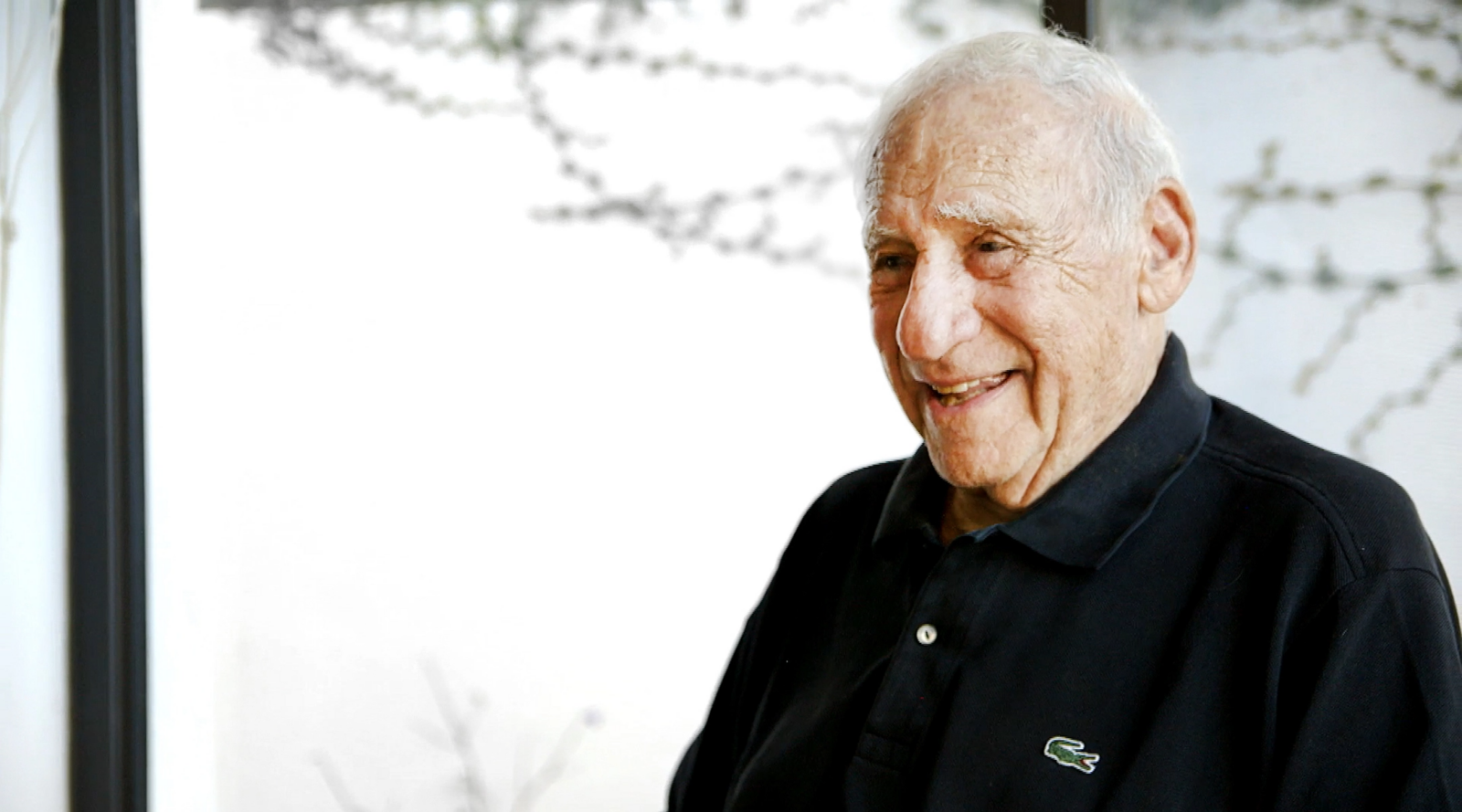Mel Brooks (Melvin Kaminsky) never camouflages the causal relationship between his Jewish perspective and his comic work. Indeed, he persistently demonstrates and explicitly acknowledges how the latter springs from the former. In both his interviews and his films, Brooks incorporates Jewish motifs and concerns, a repetitive pattern as easily recognizable in his earliest works as in his most recent picture.
Often referring to himself as “your obedient Jew”–a phrase squeaking with mock obsequiousness while affirming his outsider status–Brooks plainly situates himself, his work, and his humor within a recognizable Jewish tradition that integrates his personal history with his people’s suffering:
Look at Jewish history. Unrelieved, lamenting would be intolerable. So, for every 10 Jews beating their breasts, God designated one to be crazy and amuse the breast-beaters. By the time I was five I knew I was that one…. You want to know where my comedy comes from? It comes from not being kissed by a girl until you’re 16. It comes from the feeling that, as a Jew and as a person, you don’t fit into the mainstream of American society. It comes from the realization that even though you’re better and smarter, you’ll never belong.
Comedy Amidst Tragedy
Such a comment assumes that suffering constitutes a large segment of Jewish history, while it recognizes comedy’s role in the midst of such tragedy. In fact, Brooks’s statement goes further, expressing an instinctive understanding that comedy relieves, if only temporarily, the pain and horror of historical intolerance.
This cultural anguish finds a direct parallel in Brooks’s personal experience, where his physical appearance and religious heritage limit his participation in everything from the traditional rites of puberty to acceptance into mainstream American life. Yet, once again, grief and bitterness become crucibles that forge comedy rather than existential despair or violent recriminations. For Brooks, being a Jew means being tied to a specific tradition from which he draws both his inspiration and his comic vision.
With your help, My Jewish Learning can provide endless opportunities for learning, connection and discovery.
One finds this constant reaffirmation (some might call it an annoying redundancy or even obsessive paranoia) of Jewishness throughout Brooks’s career. Take, for example, his 1966 Playboy interview, ironically placed between interviews with Fidel Castro and Malcolm X. Brooks begins by proclaiming that he is “spectacularly Jewish,” and then goes on to assert that many top comedians are Jewish because “when the tall, blond Teutons have been nipping at your heels for thousands of years, you find it enervating to keep wailing. So you make jokes. If your enemy is laughing, how can he bludgeon you to death?”
Comic riffs about always being afraid, feeling pursued, defending yourself through humor, connecting suffering with comedy, and sensing personal difference characterize almost all of Brooks’s interviews and movies.
Flash forward to the April 1991 American Comedy Awards, a show honoring Carl Reiner with its Lifetime Achievement Award. Steve Martin introduces Brooks as Reiner’s “illegitimate son” and asks for a few words about his longtime friend and collaborator. Addressing the star-studded audience as “Ladies and Jews,” Brooks’s voice grows steadily more strident as he indignantly castigates Reiner first for not being funny and second for forcing him to assume a false identity: For 25 years he pretended that he was a Jew when he was really a gentile from Waco, Texas. (The real Waco Kid?) Finally, Brooks rips off his “false” nose, begins yelling in a Texas drawl, and vows never to utter “any more of that Jew talk.”
A few moments later, a convulsed Reiner thanks Brooks for channeling into humor his deep-seated anger over having to pay homage to someone less talented. Brooks builds all his films on his indignation, attacking serious topics such as bigotry, intolerance, and greed through comedy
The Filmmaker as Peasant
For Brooks, the very fact of being Jewish provides a framework, a cultural context, for viewing the world, a perspective he never totally casts aside. Take, for example, his seemingly offhand response to Lisa Mitchell about the current (1978) trend toward sexual permissiveness and nudity in films: “Sex–like eating Jewish foods such as chopped liver and gefilte fish–should always be a totally private matter.” Not only does his remark make the obvious equation between sex and food, but it also relates to both from a particularly Jewish point of view.
Even a gentle foray into the world of speculative thinking brings Brooks back to the past rather than forward into the future, like when he told Omni’s Jeff Rovin that he could be persuaded to go to Mars if “I could get a light-as-a-feather matzah ball. You haven’t been able to get one on Earth anymore, since the old Jews from Odessa and Kiev (his mother’s birthplace) started to die.”
In a more serious moment in 1982, Brooks related his difficulty finding funds for Frances (a Brooksfilms Production) in terms of his cultural history: “You hold your hat in your hand, and you plead and cajole and beg to get a few rubles–like a peasant, a muzhik [a member of the Russian agrarian class]. It’s like the way goyim relate to Jews anyway. They don’t think we’re serious because they don’t give us land. If they thought we were serious, they’d give us land. That’s the one thing they don’t give us, so they think we’re just transient and funny.”
The comment clearly betrays Brooks’s frustrations with a system that deals with him on predominately one level; it also displays his anger with the anti-Semitism faced by his forebears. Most important, however, the analogy Brooks draws–between himself as the modern moviemaker scouring Lotus Land for money and not being taken seriously, and his peasant ancestors denied the right to own land and thus being marginalized–explicitly connects him to this tradition of bigotry, exclusion, and hatred.
In fact, as many interviews attest, Brooks filters most of his basic emotions through his Jewish sensibility, even his anger. For example, after “serious” critics panned The Producers [Brooks’s 1968 film on which his critically lauded Broadway show is based], he exploded to Albert Goldman: “My comedy is based on rage. I’ll show those cockamamie cahiers critics. I’ll make a movie that’ll bend their bagels…. We Jews have upward mobility, you know. We’re short people but we know how to grow.”
Such an outburst contains much to be analyzed, from Brooks’s acknowledgement that rage fuels his comedy, to his inclusion of Yiddishisms, to his notion of Jews triumphing over physical limitations, to his ethnocentric assumption that cahiers critics even have bagels that he can bend.
Reprinted with permission from American-Jewish Filmmakers: Traditions and Trends (University of Illinois Press).



